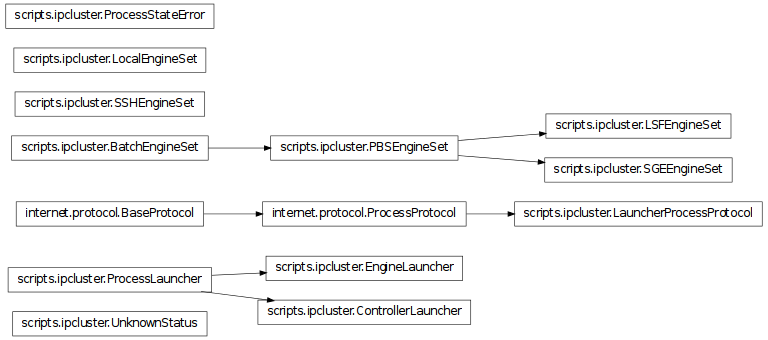kernel.scripts.ipcluster¶
Module: kernel.scripts.ipcluster¶
Inheritance diagram for IPython.kernel.scripts.ipcluster:

Start an IPython cluster = (controller + engines).
Classes¶
BatchEngineSet¶
- class IPython.kernel.scripts.ipcluster.BatchEngineSet(template_file, queue, **kwargs)¶
Bases: object
- __init__()¶
- default_template = ''¶
- delete_command = ''¶
- handle_error()¶
- job_array_regexp = ''¶
- job_array_template = ''¶
- job_id_regexp = ''¶
- kill()¶
- name = ''¶
- parse_job_id()¶
- queue_regexp = ''¶
- queue_template = ''¶
- start()¶
- submit_command = ''¶
ControllerLauncher¶
- class IPython.kernel.scripts.ipcluster.ControllerLauncher(extra_args=None)¶
Bases: IPython.kernel.scripts.ipcluster.ProcessLauncher
- __init__()¶
EngineLauncher¶
- class IPython.kernel.scripts.ipcluster.EngineLauncher(extra_args=None)¶
Bases: IPython.kernel.scripts.ipcluster.ProcessLauncher
- __init__()¶
LSFEngineSet¶
- class IPython.kernel.scripts.ipcluster.LSFEngineSet(template_file, queue, **kwargs)¶
Bases: IPython.kernel.scripts.ipcluster.PBSEngineSet
- __init__()¶
- bsub_wrapper = '#!/bin/sh\nbsub < $1\n'¶
- default_template = '#!/bin/sh\n#BSUB -J ipengine[1-%d]\neid=$(($LSB_JOBINDEX - 1))\nipengine --logfile=ipengine${eid}.log\n'¶
- delete_command = 'bkill'¶
- job_array_regexp = '#BSUB[ \t]-J+\\w+\\[\\d+-\\d+\\]'¶
- job_array_template = '#BSUB -J ipengine[1-%d]'¶
- name = 'LSF'¶
- queue_regexp = '#BSUB[ \t]+-q[ \t]+\\w+'¶
- queue_template = '#BSUB -q %s'¶
- submit_command = 'bsub'¶
PBSEngineSet¶
- class IPython.kernel.scripts.ipcluster.PBSEngineSet(template_file, queue, **kwargs)¶
Bases: IPython.kernel.scripts.ipcluster.BatchEngineSet
- __init__()¶
- default_template = '#!/bin/sh\n#PBS -V\n#PBS -t 1-%d\n#PBS -N ipengine\neid=$(($PBS_ARRAYID - 1))\nipengine --logfile=ipengine${eid}.log\n'¶
- delete_command = 'qdel'¶
- job_array_regexp = '#PBS[ \t]+-t[ \t]+\\d+'¶
- job_array_template = '#PBS -t 1-%d'¶
- job_id_regexp = '\\d+'¶
- name = 'PBS'¶
- queue_regexp = '#PBS[ \t]+-q[ \t]+\\w+'¶
- queue_template = '#PBS -q %s'¶
- submit_command = 'qsub'¶
ProcessLauncher¶
- class IPython.kernel.scripts.ipcluster.ProcessLauncher(cmd_and_args)¶
Bases: object
Start and stop an external process in an asynchronous manner.
Currently this uses deferreds to notify other parties of process state changes. This is an awkward design and should be moved to using a formal NotificationCenter.
- __init__()¶
- fire_start_deferred()¶
- fire_stop_deferred()¶
- get_stop_deferred()¶
- interrupt_then_kill()¶
- running¶
- signal()¶
Send a signal to the process.
The argument sig can be (‘KILL’,’INT’, etc.) or any signal number.
- start()¶
SGEEngineSet¶
- class IPython.kernel.scripts.ipcluster.SGEEngineSet(template_file, queue, **kwargs)¶
Bases: IPython.kernel.scripts.ipcluster.PBSEngineSet
- __init__()¶
- default_template = '#$ -V\n#$ -S /bin/sh\n#$ -t 1-%d\n#$ -N ipengine\neid=$(($SGE_TASK_ID - 1))\nipengine --logfile=ipengine${eid}.log\n'¶
- job_array_regexp = '#\\$[ \t]+-t[ \t]+\\d+'¶
- job_array_template = '#$ -t 1-%d'¶
- name = 'SGE'¶
- queue_regexp = '#\\$[ \t]+-q[ \t]+\\w+'¶
- queue_template = '#$ -q %s'¶
SSHEngineSet¶
- class IPython.kernel.scripts.ipcluster.SSHEngineSet(engine_hosts, sshx=None, copyenvs=None, ipengine='ipengine')¶
Bases: object
- __init__()¶
Start a controller on localhost and engines using ssh.
The engine_hosts argument is a dict with hostnames as keys and the number of engine (int) as values. sshx is the name of a local file that will be used to run remote commands. This file is used to setup the environment properly.
- engine_killer_template = "#!/bin/sh\nps -fu `whoami` | grep '[i]pengine' | awk '{print $2}' | xargs kill -TERM\n"¶
- kill()¶
- sshx_template_prefix = '#!/bin/sh\n'¶
- sshx_template_suffix = '"$@" > /dev/null 2>&1 &\necho $!\n'¶
- start()¶
Functions¶
- IPython.kernel.scripts.ipcluster.check_reuse()¶
Check to see if we should try to resuse FURL files.
- IPython.kernel.scripts.ipcluster.check_security()¶
Check to see if we should run with SSL support.
- IPython.kernel.scripts.ipcluster.escape_strings()¶
- IPython.kernel.scripts.ipcluster.get_args()¶
- IPython.kernel.scripts.ipcluster.main()¶
- IPython.kernel.scripts.ipcluster.main_local()¶
- IPython.kernel.scripts.ipcluster.main_lsf()¶
- IPython.kernel.scripts.ipcluster.main_mpi()¶
- IPython.kernel.scripts.ipcluster.main_pbs()¶
- IPython.kernel.scripts.ipcluster.main_sge()¶
- IPython.kernel.scripts.ipcluster.main_ssh()¶
Start a controller on localhost and engines using ssh.
Your clusterfile should look like:
send_furl = False # True, if you want engines = { 'engine_host1' : engine_count, 'engine_host2' : engine_count2 }